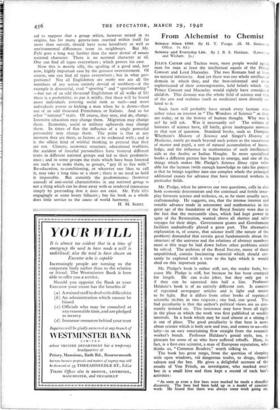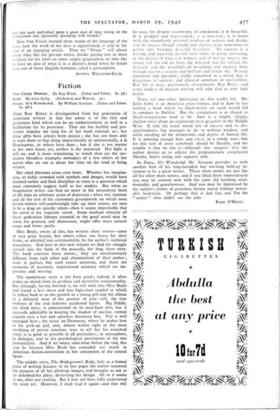From Alchemist to Chemist
Science and Everyday Life. By J. B. S. Haldane. (Lawreece and Wishart. 5s.) JULIUS CAESAR and Tacitus were, most people would agree, man for man at least the intellectual equals of the Prince
Consort and Lord Macaulay. The two Romans had at least no natural inferiority. And yet there was one whole intellectual domain in which they, and the best-informed and most sophisticated of their contemporaries, held beliefs which the Prince Consort and Macaulay would rightly have considered childish. This domain was the whole field of science and that of the arts and technics (such as medicine) most directly re- lated to it.
Such facts will probably have struck every layman who either takes an interest in " The Wonders of Science " as they are today, or in the history of human thought. Why was it
so? he will ask. Was it necessarily so? The writers of histories of science have, till lately, given inadequate answers to that sort of question. Standard books, such as Dampier Whetham's History of Science and Singer's History of Medicine, rarely go much beyond such points as the succession of master and pupil, a sort of natural accumulation of know- ledge, and the influence in mathematics of such intellectual aids as the Arabic or Indian Nought. In more specialised
books a different picture has begun to emerge, and one of the things which makes Mr. Pledge's Science Since Isoo valu-
able for the layman (with enough knowledge to take his points) is that he brings together into one complex whole the principal additional causes for advance that have interested workers in particular fields.
Mr. Pledge, when he answers our two questions, calls in also both economic determinism and the continual and fertile inter- play between science and technics, or, as he more usually says, craftsmanship. He suggests, too, that the intense interest and notable advance made in astronomy and mathematics in the great age of the foundation of the Royal Society were due to the fact that the mercantile class, which had kept power in spite of the Restoration, wanted above all shorter and safer voyages for their ships. Government grants and Goveitunent facilities undoubtedly played a great part. The alternative explanation is, of course, that science itself (the nature of the problem) demanded that certain great fundamentals about the structure of the universe and the relations of abstract numbers must at this stage be laid down before other problems could be solved. The archives of the Royal Society, many of them unpublished, contain fascinating material which should cer- tainly be explored with a view to the light which it would shed on this important point.
Mr. Pledge's book is rather stiff, not, the reader feels; be- cause Mr. Pledge is stiff, but because he has been cramped
for length. He can make jokes, but they only get in if they can be squeezed into half a line. Professor
Haldane's book is of an entirely different sort. It consists of reprinted newspaper articles and is light and meant to be light. But it differs from other books of reprinted scientific tit-bits in two respects ; one bad, one 'good. The bad peculiarity is that the author's political views are so con- stantly insisted on. This insistence may have been all right
in the place in which the work was first published at weekly intervals. In a book which may be read almost at a sitting it is out of place. The good peculiarity is that here is news about science which is both new and true, and comes to us—the laity—in an easy entertaining flow straight from the research worker's bench. Professor Haldane's genial style, too, is pleasant for some of us who have suffered rebuffs. Here, in
fact, is a first-rate scientist, a man of European reputation, who thinks us, " Common Readers," worth talking to.
The book has great range, from the question of sleeping with open windows, via dangerous trades, to drugs, tinned salmon and the bee. He gives a delightful account of the results of Von Frisch, an investigator, who marked every bee in a small hive and then kept a record of each bee's activities : " As soon as even a few bees were marked he made a dreadful discovery. The bees had been held up as a model of constant work. He found that there was always some work going on
but that each individual spent a great deal of time sitting on the honeycomb and apparently gossiping with friends."
How Von Frisch learned three words of the language of the bees, how the work of the hive is apportioned, is told in the rest of an engaging article. That on " Drugs " will please
those who, like the preaent writer, dislike paying two or three shillings for the label on some simple preparation, or who like to have an idea of what is in a doctor's mind when he hands over one of those illegible formulae called a prescription.
AMAREL WILLIAMS-ELLIS.



































 Previous page
Previous page